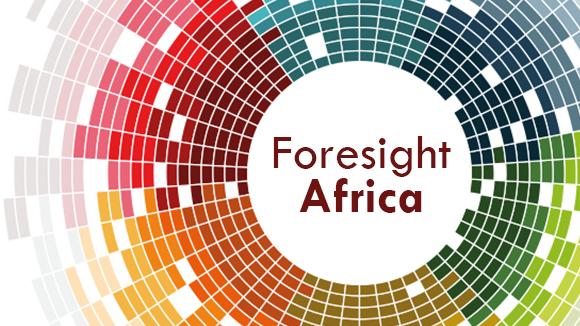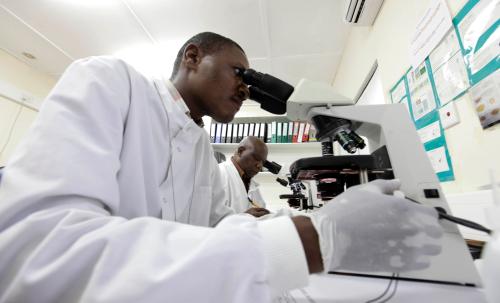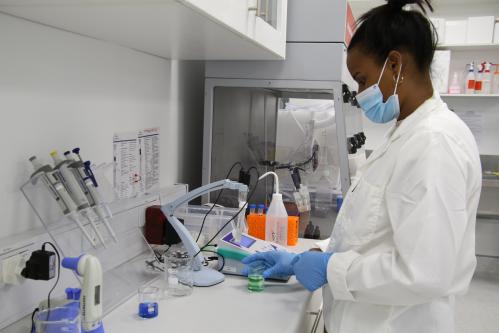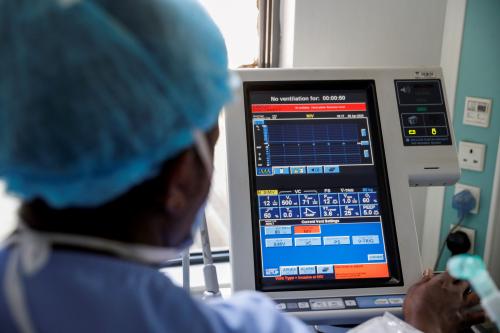Below is a governance viewpoint from the Foresight Africa 2022 report, which explores top priorities for the region in the coming year. Read the full chapter on public health.
 By developing evidence-based national medicines policies, African member states have demonstrated that they are prioritizing universal access to essential medicines and health products. Notably, 95 percent of African countries have developed policies and plans on medicines, over 90 percent on blood safety and 85 percent on traditional medicine. Such policies are vital for a robust and effective health infrastructure: For example, by developing essential health products lists, countries are better able to regulate and procure health products that contribute to patient safety and better quality of healthcare.
By developing evidence-based national medicines policies, African member states have demonstrated that they are prioritizing universal access to essential medicines and health products. Notably, 95 percent of African countries have developed policies and plans on medicines, over 90 percent on blood safety and 85 percent on traditional medicine. Such policies are vital for a robust and effective health infrastructure: For example, by developing essential health products lists, countries are better able to regulate and procure health products that contribute to patient safety and better quality of healthcare.
The strengthened political engagement has contributed to improved availability and affordability of some essential medicines, particularly for tuberculosis, HIV, and malaria. For example, in 2020, 76 percent of people living with HIV in Africa had access to antiretroviral drugs (ARVs). However, the overall availability of essential medicines in Africa remains low. In particular, the availability of medicines for non-communicable disease is only about 40 percent.
COVID-19 has exposed the extreme vulnerabilities of the global supply chain. African countries import between 70 and almost 100 percent of their medicines, vaccines, and other health products. At the beginning of the pandemic, low-income countries were relegated to the back of the queue. Border closures and protective measures restricted exports, which led to a 40 percent increase in delays and disruptions. Prices of health products increased due to market inflation, leading to products being at least five times more expensive in volume than in Europe and North America. The variation in prices between countries adds to the complexity of the market: For example, the price of a cylinder of oxygen sufficient to treat an adult for a day varies from $112 in Guinea to $23 in Kenya. These prices are completely out of reach for most health facilities in Africa. In fact, in Nigeria, hospitals rank oxygen as one of the most expensive treatments.
Strengthened political engagement has contributed to improved availability and affordability of some essential medicines, particularly for tuberculosis, HIV, and malaria.
The COVID-19 pandemic brought us back to reality, emphasizing the difficulties in maintaining a continuous supply of health products in Africa. However, to scale up local production, Africa will need to elevate regulatory standards, shape the market, and enhance the continent’s negotiation capacity in the global pharmaceutical market. The African Medicines Agency is contributing to this agenda by providing a continental-wide harmonization of regulatory standards and processes; facilitating uptake of innovative technologies for emergency preparedness and response; coordinating joint safety monitoring and assessments of medical products especially complex molecules (e.g., vaccines and biotherapeutics); and providing advice on local pharma industry development in line with the Partnerships for African Vaccine Manufacturing (PAVM), the Pharmaceutical Manufacturing Plan for Africa (PMPA) in support of African Continental Free Trade Area (AfCFTA).
The Brookings Institution is committed to quality, independence, and impact.
We are supported by a diverse array of funders. In line with our values and policies, each Brookings publication represents the sole views of its author(s).







Commentary
How strengthened political engagement can lead to improved health outcomes in Africa
March 1, 2022